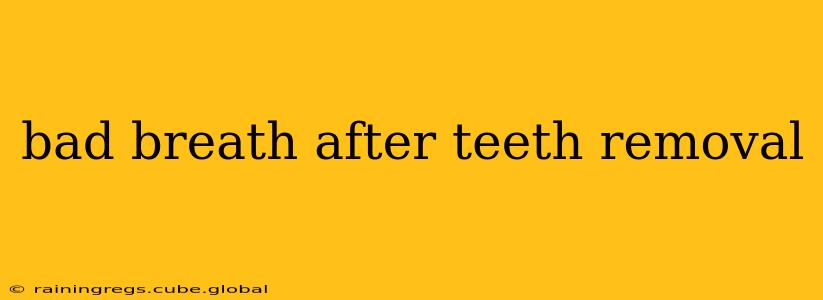Bad breath, or halitosis, is a common concern after tooth extraction. While temporary, it can be quite unpleasant. Understanding the causes and how to manage it can significantly improve your post-operative experience. This comprehensive guide will address the issue, providing practical tips and solutions.
What Causes Bad Breath After Tooth Extraction?
Several factors contribute to bad breath following tooth removal. The most significant is the wound itself. The extraction site is a perfect breeding ground for bacteria, especially in the initial healing stages. Blood clots form to stop bleeding, and as these break down, they can release an odor. Furthermore, food particles can easily become trapped in the socket, exacerbating the problem.
Other contributing factors include:
- Dry Socket: This painful condition occurs when the blood clot in the extraction site dislodges or dissolves prematurely. The exposed bone and nerve endings are then susceptible to infection and can cause a particularly foul odor.
- Infection: Bacterial infection in the extraction socket is another potential cause of bad breath. This is usually accompanied by other symptoms like pain, swelling, and pus.
- Medications: Some medications can have a drying effect on the mouth, leading to decreased saliva production. Saliva is essential for neutralizing bacteria and keeping the mouth clean, so a reduction can contribute to bad breath.
- Poor Oral Hygiene: Neglecting oral hygiene after tooth extraction can significantly worsen bad breath.
How Long Does Bad Breath Last After Tooth Extraction?
The duration of bad breath after tooth extraction varies depending on individual healing rates and adherence to post-operative instructions. In most cases, it resolves within a few days to a week. However, if the bad breath persists beyond a week or is accompanied by other symptoms such as pain, swelling, or fever, it's crucial to consult a dentist immediately.
How to Prevent Bad Breath After Tooth Extraction?
Proactive measures significantly reduce the chances of developing bad breath post-extraction. These include:
- Maintain meticulous oral hygiene: Gentle rinsing with saltwater (a quarter to half teaspoon of salt in 8 ounces of warm water) several times a day can help keep the extraction site clean and promote healing. Avoid forceful rinsing or spitting, as this can dislodge the blood clot.
- Follow your dentist's instructions: Adhering to post-operative instructions is crucial. This includes taking prescribed medications, avoiding smoking, and refraining from using straws, which can create suction and dislodge the blood clot.
- Eat a balanced diet: A healthy diet supports the body's natural healing processes.
- Stay hydrated: Drinking plenty of water helps keep your mouth moist and washes away food particles.
- Avoid smoking and alcohol: These can hinder healing and increase the risk of infection.
What if I Still Have Bad Breath After Following These Tips?
If bad breath persists despite following all recommendations, it's essential to consult your dentist. They can examine the extraction site to rule out complications like dry socket or infection. In case of infection, your dentist will likely prescribe antibiotics to clear the infection and alleviate the bad breath.
Can I Use Mouthwash After Tooth Extraction?
The use of mouthwash after tooth extraction is a common question. While it might seem like a good idea to freshen your breath, it's generally recommended to avoid alcohol-based mouthwashes in the immediate post-operative period, as the alcohol can irritate the healing wound. Your dentist may recommend a specific mouthwash or suggest using saltwater rinses instead.
Is Bad Breath After Tooth Extraction a Sign of Infection?
While bad breath itself isn't definitively a sign of infection, it can be a symptom. Persistent bad breath along with other signs such as pain, swelling, fever, or pus indicates a potential infection requiring immediate dental attention.
Conclusion
Bad breath after tooth extraction is often temporary and manageable. By following proper oral hygiene practices, adhering to post-operative instructions, and seeking professional care if necessary, you can minimize the discomfort and ensure a smooth recovery. Remember, early intervention is crucial for addressing any potential complications. Don't hesitate to contact your dentist if you have any concerns.
